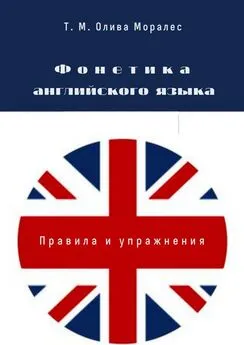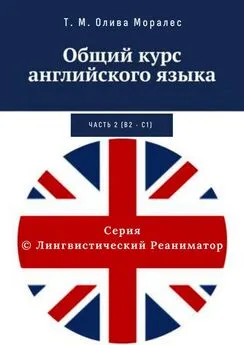Владимир Аракин - Практический курс английского языка 1 курс. Ключи
- Название:Практический курс английского языка 1 курс. Ключи
- Автор:
- Жанр:
- Издательство:ВЛАДОС
- Год:1998
- ISBN:нет данных
- Рейтинг:
- Избранное:Добавить в избранное
-
Отзывы:
-
Ваша оценка:
Владимир Аракин - Практический курс английского языка 1 курс. Ключи краткое содержание
Учебник является первой частью серии комплексных учебников для
I - V курсов педагогических вузов.
Цель учебника – обучение устной речи на основе развития необходимых автоматизированных речевых навыков, развитие техники чтения, а также навыков письменной речи.
Практический курс английского языка 1 курс. Ключи - читать онлайн бесплатно полную версию (весь текст целиком)
Интервал:
Закладка:
version="1.0" encoding="utf-8"?> tbg_higher Владимир Дмитриевич Аракин 220516 Т В Федуленкова 317727 Практический курс английского языка 1 курс. Ключи
Упражнения, Задания: Ключи к Учебнику.
Учебник является первой частью серии комплексных учебников для
I - V курсов педагогических вузов.
Цель учебника – обучение устной речи на основе развития необходимых автоматизированных речевых навыков, развитие техники чтения, а также навыков письменной речи.
 ru ВЛАДОС 1998 686851
ru ВЛАДОС 1998 686851
Предисловие
Предлагаемая организация сичистгнттрлыгой, внеаудиторной работы студентов способствует более прочному усвоению ими активного вякабудяра и высвобождению значительной части аудиторного времени для творческой работы на изучаемом иностранном языке.
Автор
Lesson Four
Ex. XII. p. 47
1. la she a doctor? — Yea, she is. She is a good doctor,
2. She ig seventeen {years old / years of age), isn't she? — Yea. she is.
3. Your brother is fourteen, isn't he? — Yes. he ia.
4. Is he fourteen or fifteen (years oldj? — He is fourteen.
5. This ball is small, isn't it? — Yes, it Is.
6. ta the pencil small or big? — It is big.
7. They are not busy* are they? — No, they are not. Й. He is busy, isn't he? — Yes* he is.
9. He is out, isn't he? — Yes H he is. He is out,
10. He ia in. isn't he? — Yes, he ia.
11. It is a leather bag. isn't it? — Yes. it is.
12. Is it a difficult or an easy text? — It'aaneaay tent. / It's an easy one.
13. The text is not difficult, is it? — No.itisn't.
14. It's eleven (o'clock) now, isn't it? — Yes, it ia.
15. 1sitclevenortwelve{o'dock>now? — It's eleven (o'clock) (now)*
16. It la not twelve yet. is it? — No, it isn't. 1?. It is cold.
IS. Is it cold?
19. It ia cold, isn't it?
20. Is It cold or hot In the hall? — It'scold.
21. It isn't hot in the hall, is it? — No. it isn't.
22. Take the map (the lamp, the pen. the notebook / the exercise book t the paper).
23. Don't take my ball (my bag, my pencil, my skates, my things).
24. Don’t home alone.
25. It'a dark. Go home.
Lesson Five
Ex. VIII, p. 60
1. No, lie isn't. Doctor Sandford Ls out,
2. Doctor Sandford Is still in the hospital.
3. No, she isn't, Mrs. Sandford is out.
4. Yea, she ia. Mrs, Sandford is in the park with Benny.
5. No, she isn't. She isn't in the garden.
6. But yes. she is. Old Mrs. Sandford is not well,
7. No, she isn't. Old Mrs. Sandford is not in bed.
3. Yes, she is. She is belter today.
9. Yes. he is. Mr. Sandford is at home after four on Saturday.
10. He ia at home after four on Saturday. Ex. IK, p. во
1. Are they in the garden or in the park?
2. ls your slater at the Institute or at / in the library? 3– Is Doctor Sandford at the hospital or at home?
4. Is his wife in the park or in the yard?
5. fs the exercise easy or difficult?
6. Is Betty nineteen or twenty?
7. Is the hall big or small?
S. Arc you free on Saturday or on Sunday?
9. Are these leasons difficult or eaay?
10. Ia thisaentence longer short?
ь( 1. They are in the garden, aren't they?
2. Your sister is at the Institute, isn't she?
3. Doctor Sandford is nl the hospital, isn't he?
4. His wife lain the park, isn't she? 5– The exercise is easy, isn't it?
6. Betty is nineteen, isn't she7
7. Thehall isbig.isn't it?
8. Yon are free on Saturday, aren't you?
9. These leasons are difficult, aren't they?
10. This Eienlence ia long, isn't it?
1. These areboxea,
2. These are apoona,
3. Those are forks,
4. These are parks.
5. Those are gardens.
6. These arc desks. 7 г Thoae are doors.
8. These are my birds.
9. Those are his dogs,
10. Those are her daughters,
, p. 81
shortfall] — shorter |'/э:Гз| — the shortest {flo Jprtttt] Ы1{Ы] – taller {Ыэ] — the tallest {Лэ l^lisrj large {lfl:cbl — larger l']a:dj3] — the largest {da ЧанЬы] nice {патч| — nicer {'nai&a] — the nicest {As *iiaiSLSl] Long (Ion] — longer I'Jona| — the longest {to 'Jnriist] b1K Ib'g] — biR-ger {'begs] — the biggest {Дз 'brgisi| red (red] — redder {Veda] — the reddest {Да 'redist] high Ihai| — higher |'haia] — the highest {Да 'Ьан5Г| dirty fd^li] dirtiorfda iia] — the dirtiest foa di:n^t] faat {fflESt] — faster (lbs Is] — the faslcsL{&> Tatstisl] easy {4-zi] — easier {' kzis]— the easiest {ds'hzN&l] good {gud] — belter {bcla] — the besl {Дз best] bad {ba?d| — worse {w.s] — the worst {Дэ V3:st] few {fju:l —fewer {'Iju^l —the fewest {Дз tjunsl) busy Г"Ь тй|] —busier {'bms| — the busiest {Й*> 'btzifst] near {ma| — nearer {'шага] — the nearest {rta 'niarisi| / the next |Да 'nek&l]
far {fa:] — farther {fu: оз] / further {Ъ.да] — the farthest {fo
Tavist] / the furthest {Дз [1] f:i:drst] old(Hj]dl— older Isolds]/elder {ЪЩ – theoldes^a toklj&ll /
the eldest {– eldist] late{len| —bter|'le]!fl|/latter I'l^la] —the latest{Дл '!ет1Ы| /
the last flast]
thin {От J — thinner l^irwj — the thinnest |3э
thick {0m| — thicker {'Oike] — the thickest Jd3 "OifcnjlJ
comfortable I'kAmforabll — morecomfortBble|'ino:'kAinf3t3b{] —
the most comfortable \дэ InHUsI 'клшГзюЫ! interesting {'inlrsstmj — more interesting '{TiErsstin] —
the most interesting {03 'nisust 'inErjstLnJ difficult {difibl 11 — more difficult J?nj:'difikaUJ — the most
difficult {оо'тэиз! difiksltj narrow {'nieraiTj —narrower fnajrsun-] — the narrowest \Аз
'пазпттсчг]
Ex. Xllr p. 61
11. This boy is not so clever as that one.
E*. XIII, p. 61
1. She is Leas tired than 1 amr
2. The child ia less sleepy than you are.
3. This taak ia less important than Hint one.
4. This book is less interesting than that one.
5. Spanish is less difficult than Chinese.
6. There is Less ink in my fountain pen than in yours.
Ex, XIV, p. fit
1. Iail?2, Isit? 3.Isit?4.Isn'tlt?5. Is it?6\ isn'tlt? 7, Isn't it? 8. Isit?9. lsn,Lit?lO,Isit?n, Isit?l2,Ibn4it?l3. Tsn4 lt?14.Ian'tit?
Lesson 5i> – &
En. XVI. p. G2
1. Ia Mr. Sandford at homo after four on Saturday?
2. Is my brother still at the office?
3. Is Mr. Smith в good doctor? 4– Is my mother glad to see you?
Ex. XVIII, p. 62
1. What's the matter? / What's up? — John ill.
2. Ts he in bed? — Yes, he is. But he is / feels better today,
3. Is Tom in? — No, he is out. Ho is usually at home at five (o'clock).
4. On Saturday lam at home at foil г (o'clock). b. Where is Benny? — He is in the park.
6. What ia he? — He is a doctor.
7– la Doctor Sandford in/at home?— He is still in the hospital.
5. Benny is in the park, isn't he?
9. When are they at home on Saturday? — At sin (o'clock).
10. They arc always glad to sec you.
11. What a pity / That's a pity, he is out / he is not at home.
12. What a pity / That's a pity, she is still in bed.
Lesson Six
Ex. VII, p, 76
1. Her full name is Elizabeth Louise Smith.
2. She is a college graduate. She is a writer, just a beginner,
3. Yes. she has. She has got many companions.
4. Yes, they are. Her companions are kind and jolly.
5. Belly'a elder sister, Helen, ia married to Henry Sandford, 6– Yes. she is. Betty is a member of her sister's family.
7. Her brother-in-law is a doctor.
8. He has a mother, but he has no father.
9. No, she isn't. Helen is a housewife.
10. They have only one child. Benny.
11. Betty's nephew is four.
12, Yes. he is. But sometimes he is naughty.
13– He is fond of birds and animals.
14. No, he isn't. He Is eager to haves rabbit.
15. Yes, they have. They have got many animals and birds in the house.
Ex, IX, p. 76
1, my mother's brother 2. my sister's friend 3 r his daughter's husband 4, my parents' house 5. my father's table 6. my mother's work 7. this student's notebook 8. these students' notebooks 9. my friend's sister 10, onr cousin's friend 11. my grandfather's photo 12. Pete's room 13. her brother's son 14. Ann's daughter 15. my mother's sister
Ex. XaJ, p. 77
1. What faculty are you students of?
2. What is her brother-in-law?
3. What is Betty Smith?
4. Whn t is ni у s ister-iii-1 aw ?
5. Is his family large?
6. How many children have they got?
7. Has she got a sou or a daughter?
8. What is their child's name?
9. What is her name?
10. How old is his nephew?
11. Where is he?
12. Is she a German student?
13. Whoae sister is Betty?
14. What has she got on the table?
15. Has Benny any brothers?
16. What age ia their grandmother of?
17. What age is Dr. Sandford of?
Ex. XII, p. 77
1. cousin 2. grandfather 3. nephew 4. niece 5. uncle 6. aunt 7. eouain 3. grandmother 9. sister-in-law 10, brother-in-law
Ex. XIII, p. 77
1. am 2. is 3. are 4. is. are 5. are fl. Is 7. Are 8. ia 0. are. am 10. are.arell. Are 12. Are 13. areI4,Isl5, is 16. am 17. am lS.lsie. ia
Ex. XIV, p. 78
1. to 2. at, in. with 3, at 4. into 5. in 6. into 7. out of 8, in 9. into 10. from 11. in/under 12. to 13– to 14. out of 15. in 16. to 17. of 18. in 19. at 20. of. at 21. at, of
Ex. XV, p. 78
1. any, any 2, any, aomc 3. по. a 4. some / no 5. any, any 6. some / по 7. anyS.anyO, aomc/по 10. any. some 11, any, none 12. any 13. no / some 14. no / some
Ел, XVI, p. 78
writer, worker, teacher, reader, painter, singer, examiner, dancer, listener
Ex. XVII, p. 78
three, nine, eleven, twelve, fourteen, fifteen, nineteen, thirty three, forty-four, sixty, ninety-nine, a / one hundred
Ex, XVIII, p. 79
the first, the third, the fifth, the ninth, the nineteenth, the second, the fourth, the eighth, the twelfth, the twentieth
Ex. XIX, p. 79
Forty-six plus eighteen issixty-four.
Fifteen minus eight is seven.
Eighty minus thirty is fifty.
Nine plus eleven is twenty.
Four plus forty is forty-four.
Ten plus eight is eighteen.
Seventy-nine minus fifty is twenty-nine.
Интервал:
Закладка:




![Владимир Аракин - Практический курс английского языка 3 курс [calibre 2.43.0]](/books/1072035/vladimir-arakin-prakticheskij-kurs-anglijskogo-yazyk.webp)





